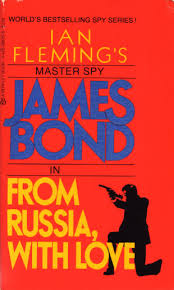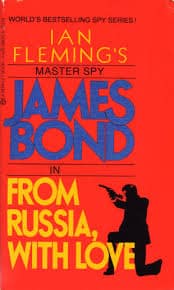No, I haven’t forgotten about this feature that I did for two weeks only and then skipped for a month!
From Russia, With Love
Around sixth or seventh grade was when I first decided to try watching James Bond, since I had heard they were pretty good. They were not. Not letting crappy stories get in my way, I kept trying for some unfathomable reason anyway (I write this blog, after all). There have certainly been moments I’ve enjoyed (generally the new ones, because I can only take so much camp), enough where I didn’t write it off enough to have some curiosity about the original books, and felt I should give one a go. I picked up From Russia, With Love, because I seem to recall it being the one that bored me the least, and give it a go in a genre my girlfriend rather humorously penned as, “books about a white man written by a white man”.

Now, before I get into this, and whether this is any good or not, we’re going to play a quick game. It is a game I like to call “James Bond Chapter Title or Black Sabbath Song?”
- The Slaughterer
- The Straightener
- The Moguls of Death
- Children of the Grave
- Konspiratsia
- Behind the Wall of Sleep
- Hand of Doom
- The Wizard of Ice
- Into The Void
- The Tunnel of Rats
Can you tell the difference? What if I told you there were half of each? Do you think that a cold war spy series sharing tonal similarities with a death metal band is maybe not the best thing to be tonally similar with?
I don’t know where to begin. It’s paced horrendously, fluffier than most of the books we read on this blog, misogynistic, homophobic. Bond doesn’t show up page 90 of a 250 page book. Characters show up, are given elaborate backstories and motivations, and then dismissed without any further development. Women take their shirts off for no particularly clear reason. Everything about this book is terrible. And to top it all off, it’s dumb. It’s really, really dumb. The villains’ evil plan is, I shit you not, to do something bad. I’m not kidding. There’s like a whole chapter where Soviet spies are sitting around a table talking about how the world thinks the USSR is so good now, so they have to do something bad. And that is why the book happens. Because the bad guys want to do a bad thing so the world knows that they’re bad.
‘The foreign policy of the USSR has entered a new phase. Formerly, it was a “hard” policy. […] A new polcy was created – the “hard-soft” policy. Geneva was the beginning of this policy. We were “soft”. China threatens Quemoy and Matsu. We were “hard”.’
I swear to god, there’s a whole chapter of this. There’s a whole chapter of the bad guys explaining that sometimes they’re bad, but sometimes they’re not bad, and now it is time to be bad.
Sure, you might think, it’s a dumb spy novel. Once we get the obligatory – maybe super obligatory, in this case – motive out of the way, it’s all action and fighting and all manner of exciting daring-do!
WELL, THAT’S WHERE YOU WOULD ALSO BE WRONG.
The main premise of the novel is that the USSR is going to trick Bond into what he thinks is an assignment rescuing a girl (obvs) wishing to defect from the commies, but is actually a set up for a scandalous murder-suicide that will shame the English spy ring as the Western world is shocked by the lurid story. Naturally, half of the book takes place in Turkey with an unrelated plot to kill another agent who is not Bond, and also gypsies. As one does when writing a story about not that.
When the book finally does remember what’s going on and gets back to the bit with Bond and the USSR scandal plot, one of the previously elaborately-developed characters comes back with a completely different character, who is then defeated in an action scene that contains plenty of stupid shit, which can be best summed up with the bit where Bond dodges a bullet at point blank range by diving towards the gun. If the worst Bond movies can be described as movies where you check your brain at the door, this is a book that requires you to leave your eyeballs at home in order to read it.
And that’s, of course, to say nothing of the sexism, because everybody knows that James Bond is misogynistic as a swine flu-infected grizzly bear wrapped up in the meth trade is a poor house-pet. But I will leave you with this delightful gem, because it is an actual sentence made by an actual character in this novel we’re supposed to like:
‘All women want to be swept off their feet. In their dreams they long to be slung over a man’s shoulder and taken into a cave and raped.’
This point actually segues into my final reason why everything in this book is inane nonsense: everything in this book is based on generalizations. It makes for a sexist work when it declares all women are like x, certainly. But what’s the point of a spy novel where all English are like x, all Soviets are like y, all Americans are like z, all Middle-Easterners are… and that’s literally everything. All the espionage falls flat, because instead of ever feeling like clever, insightful subterfuge, it just feels like everything is based on broad, sweeping generalizations. Which brings me to my next point…
Can You Explain It In Terms Of Other Books We Read On This Blog?
A book where everybody’s motivations and characteristics are based entirely on a very broadly defined and not-especially-specific group they belong to, and those generalizations are somehow supposed to drive the entire conflict? Goddammit, I’m just rereading Divergent!
And that’s basically all you need. It’s as fluffed up and driven by overgeneralizing characters and “we’re evil because we’re evil” villains as Divergent, so if you’ve ever had any particular curiosity to read the novels behind the James Bond movies, just know they’re not really that far off of Divergent. And then I guess you replace Tris with Christian Grey.
And you know what? If I’m going to read something this dumb, I’d much rather read it with a reasonably complex female lead than a bland white dude with inexplicable universal charm. Might as well get some diversity up in here.
And Also Currently Listening
My girlfriend and I have shared Postmodern Jukebox with each other for a while, and I recently discovered it’s also all on Spotify, too. It’s the perfect solution for people who wish that if pop music has to be so catchy, then that it didn’t also have to be so shitty. Evidently all it takes to make it not ridiculously shameful to listen to “Timber” is an old-timey 1950s doo wop rewrite.
Having at long last become a Spotify convert has, on the one hand, presented me with a quandary about whether the value of things has any meaning (If I sign up for Premium, then am I paying forever to not own all of something? Isn’t that why I’m already doing now?). But on the other hand, it has made it a lot easier and faster to go through end of year music lists. From a year ago. Anyway, this is all to say that I discovered CocoRosie, which is a sort of gothic electronic/folk, which is in turn all to say that I realize I’m sort of pretentious, and probably shouldn’t be surprised I fucking hate James Bond.
Lastly, I rediscovered an album a college friend of mine showed me senior year by Prinz Pi. It is a German rap album about Lord of the Rings. This is a real thing that is real.



“Alex Rider” is a far superior young adult version of James Bond. Fantastic series. “Eagle Strike” should go down as a classic of the spy genre, but won’t because of the bias against young adult books. Horowitz is an excellent writer.
The key to the series is that it’s totally, utterly ridiculous but Horowitz still does not talk down to the reader. Even when Alex is doing these insane things Horowitz does his damndest at the time to make all of the technical details dead on accurate and to try and give Alex at least semi-plausible reasons for doing what he’s doing and being such a badass.
The result is that when the book ends you don’t even realize you just read about a fourteen year old who was trapped in a fishing tank with a Portuguese man-o-war, and who escaped by using the special gadget given to him by the obese gadget master known only as “Smithers”. The gadget dissolved metal, opening the tank and causing the jellyfish to land on and kill one of the villains.
And this is one of the least insane things Alex does. In book six he goes into SPACE. And when you read it the whole thing is entirely believable. It’s only afterwards that it hits you that the whole thing is batshit crazy.
HOLY SHIT I LOVED ALEX RIDER. Point Blanc and Eagle Strike were my favorites. I actually want to go back and finish the last few in the series…
I forgot about Smithers! Smithers was fucking dope.
The books drop off a bit in quality past “Scorpia”, though they’re all good.
The finale was disappointing. Most of the series does a fairly good job of making MI6 look, if not justified, at least understandable, because Alex is preventing massive world-shaking mass-murders and large scale disasters.
In the final book, he needs to stop the assassination of one person, and not even a world leader like the President or something, but the Secretary of State. And this is the big finale? I mean, in the previous book he prevented a famine in Kenya. Come on, Horowitz could do better than that..
Ugh, that’s disappointing. I remember the last one I read (snake or cobra something idk) was really boring, but had an ok twist
Ah, “Snakehead”. It was one of the weaker books in the series, but I loved the sequence where he escaped from the organ harvesting hospital. That was fun.
Twist was good.
“Crocodile Tears” is another okay one, the next book in the series. Once again, it’s weaker since it’s post Scorpia, but I enjoyed the very last scene of the book.
I will say this about the final book: There is a scene in it with Smithers that is just spectacular, and it culminates in a final twist involving Smithers’ character that was awesome and unexpected and absolutely perfect. For that alone, the book is worth reading.
By the way, I’m reading EVERYTHING right now. T.H. White’s “The Once and Future King”, which is fantastic. “Eifelheim”, by Mike Flynn, which is fantastic sci-fi. “The Mists of Everness”, by John C. Wright”, which is a ton of fun. And on the back burner is “A Canticle for Leibowitz”, Asimov’s “Foundation”, and Tom Kratman’s novella “Big Boys Don’t Cry”. Basically, lots of sci-fi and fantasy.
Currently writing: A story (potentially book) about a twenty something who is brought to Logres, the alternate mythological version of England around during the time of King Arthur, because he is the last descendent of the royalty of Camelot. The twist is that he is the descendent of Guinevere and LANCELOT, not Arthur, which makes his claim to the throne highly suspect. To gain the throne and save both England and Logres he must go on a quest to find the Holy Grail.
And that is why I’m reading “The Once and Future King”.